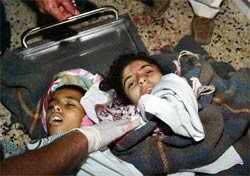It was just before midnight (Tuesday, May 18th.), when I tried to contact my friend Mohammad from the worst hit neighborhoods in Rafah, in the south of the Gaza Strip. Earlier on, during the day, I made several attempts to contact my friend, but with no success. News from Rafah started to become extremely worrying about the high number of killed Palestinians at the Tel Al-Sultan area of Rafah.
The Israeli army killed fourteen people in the morning of Tuesday alone. Journalist inside the area talked over the phone about injured people in the streets bleeding to death and calling for immediate help. But, Israeli snipers prevented ambulances and private cars from reaching the dead or injured by shooting at any one who came near those lying in the middle of the street.
I was increasingly becoming worried Mohammad. I tried again and the phone rang on the other end of the line and finally after about a minute or so, a deep, low, and tired voice answered. Mohammad said that his house was actually in the middle of Israeli army military operations.
“I am talking to you and there is a tank right below our house. Apaches are flying above us and firing at surrounding houses. We are all now in one room and no one can leave it unless it is urgent,” said Mohammed, who lives with his parents and seven brothers and sisters.
The normally upbeat and cheerful Mohammed spoke with a voice that reflected the deadly danger and extreme situation he was in. “It is death all around us,” said Mohammad, continuing, “I tell you there are more than twenty bodies lying on the streets near our house. Some of them dead. Others are injured and bleeding to death waiting for ambulances to arrive. Israeli snipers occupied every tall building in the area and shoot at any moving object. They shoot at ambulances and rescue teams.”
He also described how they were being restricted and confined to one room. To leave the room, they must crawl down to avoid being seen through the windows. Adults in the house prevent children from leaving the room. “What is worst about this is that children are going crazy when they hear the explosions of missiles and the firing from tanks. Imagine, when the soldiers in the tank below keep firing the heavy machine gun continuously for three minutes, with the terrible sound it makes. Children cannot take it. They go crazy.”

Original AP caption: The bodies of Palestinian Ahmed Mughayer, 13, and his sister Asma, 16, right, are wrapped in blankets after being brought from the Talesultan area of the Rafah refugee camp, in the southern Gaza Strip, Tuesday, May 18, 2004. Both were on the roof of their three-story apartment building when they were hit by army fire, said their older brother, Ali. The shots were fired from an Israeli army position on the sixth floor of the neighboring building, he said. (AP Photo/Kevin Frayer)
A couple of hours later, the brother and sister died on the roof of their house.
The phone line was cut suddenly and I tried to call again but to no vail.
Media sources reported the killing of more than twenty Palestinians that day and more than forty injured that day. Many Rafah residents pleaded through local radio stations to international organizations like UNRWA, Red Cross and Kofi Annan to allow ambulances and medical teams to reach their devastated areas.
People in Rafah know that the attack on Tel Al-Sultan area carries no significant military propose because the area is not adjacent to the border in which Israeli claim there are ongoing activities of weapons smuggling. Also, Israeli military posts and settlements overlook the area directly. One local municipal leader said that the attack by Israel on this area is “to kill for the sake of killing only.”
The latest news from Rafah speaks of how the Israel army is demanding local people leave their homes and go to nearby schools. But Palestinian radio stations urged the people not to do so because Israeli soldiers and snipers are actually selecting young men from the crowds and shooting at them. A number of dead bodies are still lying in the open.
Related Links
